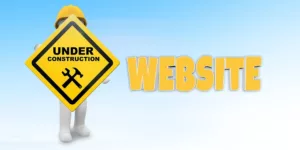In 2000, there were only about 17 million websites. Currently, that number has ballooned to almost 1.2 billion websites. It doesn’t take much to see that the means to create a website quickly are much more widespread today than they were a decade or two ago.
Getting a website up and running in the past required a significant amount of investment and work. However, it’s much simpler now with the hosting services that are available as well as the sheer breadth of coding knowledge that’s both present online and accessible for free. Anyone can pick up the basics of HTML and CSS in a few days simply based on the intuitive nature of the language and the quality of the tutorials instructing you how to code efficiently.
The only thing holding most people back from creating their own websites is the aversion that many people have to dealing with technical features such as coding. Luckily, there’s quite a large library of resources to help you through this process. Further, the expansion of hosting services have made the process of registering a domain name very simple and painless. Let’s dive in.
Developing Basic Fluency in HTML and CSS
A key step to being able to get a website running is having a basic knowledge of HTML and CSS code. HTML stands for HyperText Markup Language and its primary function is to allow the contents of a webpage to adhere to a certain format. The role of HTML is to define and describe a webpage’s content.
Meanwhile, CSS plays an important role as well. CSS stands for Cascading Style Sheets and it functions in conjunction with HTML to help a page appear more dynamic and to improve the aesthetic presentation of that page to visitors. Picking up the fundamentals of HTML and CSS will give you insight into the basic architecture of web pages. It’s possible to see the actual coding behind any web page by right-clicking and pressing “View Page Source” in your browser.
Anyone can develop a basic fluency in HTML and CSS by practicing for a few days. Some of the best free websites that can aid your efforts to acquire this fluency are w3schools and freeCodeCamp. These websites are ideal resources because they clearly explain the functions of different HTML and CSS elements before allowing you to fiddle and experiment with those elements yourself in the web’s built-in console.
The quickest way to know if you have a good sense of HTML and CSS elements is by visiting some of your favorite sites and accessing the page source. If you can match the HTML and CSS in the page source to the actual elements on the site, then you’re in a good spot. Dedicating two or three days to learning should be an ample timeframe.
Choosing a Hosting Service
Nowadays, there are several affordable domain registration and hosting services that you can choose from to aid in the development of your website. IPage is a great service for beginners to use because it has an extensive offering of domains and an intuitive dashboard interface for when you begin hosting your page. After you pay for a domain name and register an account, you should be able to host files in connection with that domain name.
Of course, the files that you upload and end up hosting will be HTML and CSS will be files that you’ve coded yourself. Making a directory of folders with one page specified as the home page and the other pages separated into CSS or Javascript elements will allow the hosting service to process and display your site. If you don’t have the time to code your own website, it’s possible to get HTML and CSS files and directories from online sources. A brief Google search will land you a considerable number of results and landing pages that show a bank of templates.
Optimizing Your Website
After you’ve gone through and uploaded all the necessary files onto your hosting service that are important for the presentation and design of your website, you can begin to optimize your site based on principles of SEO to have it rank higher on search engine results. You’ll also want to check out ways in which search engines function and the set of new features that users and businesses often use to locate the most relevant results.
Developing a website is a relatively simple process because of the number of shortcuts available today. You no longer need to worry about the specifics of hosting, or even, designing a functional website from scratch because of all the free resources and templates online. It’s no exaggeration to say that you’re just a few days away from creating your own fully functional and live webpage. What are you waiting for?








